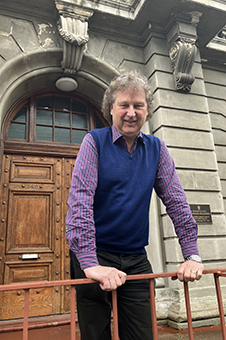Friday 28 October 2022 3:28pm
Why do we look the way we do? Why does one cat, one dog, one person, fish, insect, or even tree look different to another?

Professor Hamish Spencer
It’s a huge question, but one Distinguished Professor Hamish Spencer, of the University of Otago’s Department of Zoology hopes to find out with the aid of a Royal Society of New Zealand James Cook Research Fellowship.
The Fellowship, announced today, is awarded to researchers at the height of their careers, allowing them to undertake study or research in their field of endeavour for two years, recognising their sustained research excellence. The funding package annually is $100,000 plus GST and $10,000 plus GST in relevant expenses.
Professor Spencer was one of three to receive the award nationally.
An evolutionary biologist, Professor Spencer uses mathematical modelling and molecular genetics to understand the processes driving the evolution of the world’s broad biodiversity. With this Fellowship, he is aiming to resolve the “paradox of variation”.
“If you look at any population of living organisms, you will see differences. People on the street look different from each other; cats do too. Even creatures we are less familiar with – snails, birds, insects – show variation, as, of course, do plants. To some degree, these differences reflect genetic differences among individuals. This heritable variation is at the heart of evolution, as Darwin pointed out,” he says.
“Natural selection accentuates these differences to bring about evolutionary change; without any genetic differences, evolution doesn’t happen. Genetic differences are also critical to artificial selection: different dog breeds, for example, have come about because of the genetic differences underlying the various traits that dog breeders favoured.
“Yet, we do not know why these populations have all this variation - although it is originally generated by mutation. We do not know if it is preserved by natural selection or whether it is neutral, irrelevant to current selection pressures.”
That distinction matters, he says.
“If the variation is preserved by selection, it is likely that more variable populations are healthier, a conclusion that concerns many science users, from animal breeders to conservation managers of threatened species. Clearly, answering this question is important and, yet, it has been an unanswered central question in evolutionary genetics for over fifty years.”
Using new mathematical models in conjunction with computer simulations, he will enhance understanding of how evolutionary processes interact with each other and how this shapes genetic variation.
“This research will improve what are currently overly simplistic genetic models and explain the levels of genetic variation seen in nature. A resolution of the ‘paradox of variation’ will have implications for fundamental evolutionary biology to numerous applications in agriculture, conservation, medicine and beyond,” Professor Spencer says.
Receiving the Fellowship is an honour, he says.
“I’m extremely grateful to the Royal Society Te Apārangi for this opportunity. I would also like to thank the Department of Zoology at the University of Otago for providing – over many years – such a fertile environment for research.”
For more information, please contact:
Distinguished Professor Hamish Spencer
Department of Zoology | Te Tari o Mātai Kararehe
University of Otago | Te Whare Wānanga o Otāgo
Email hamish.spencer@otago.ac.nz
Lea Jones
Media Engagement Adviser
External Engagement | Te Ringa Toro
University of Otago | Te Whare Wānanga o Otāgo
Tel +64 21 279 4969
Email lea.jones@otago.ac.nz
